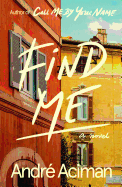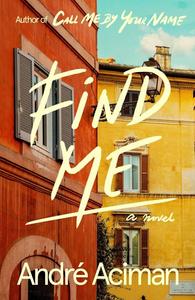
 André Aciman has proven himself to be a keen observer of the human interior from his first novel, Call Me by Your Name, to its highly anticipated sequel, Find Me--as well as the three other novels in between, and several books of nonfiction. He excels in realms of heartrending poignance, overwhelming desire and all-too-human ambivalence, with a mastery of language to pinpoint every emotional hue. After the phenomenal response to director Luca Guadagnino's film adaptation of the earlier novel, the sequel might seem like a foregone conclusion--until one begins reading it.
André Aciman has proven himself to be a keen observer of the human interior from his first novel, Call Me by Your Name, to its highly anticipated sequel, Find Me--as well as the three other novels in between, and several books of nonfiction. He excels in realms of heartrending poignance, overwhelming desire and all-too-human ambivalence, with a mastery of language to pinpoint every emotional hue. After the phenomenal response to director Luca Guadagnino's film adaptation of the earlier novel, the sequel might seem like a foregone conclusion--until one begins reading it.
Catching up with one-time lovers Elio and Oliver is not, from its outset, the obvious intent of Find Me. Instead, the novel chooses Elio's father, Samuel, as its reentry point into heady affairs that span tantalizing Italian settings. It's a decade later, and Samuel is on a train to Rome to visit his son, a professional musician, when he meets Miranda, a striking woman much younger than he. Dissatisfied with the ways love has mistreated them in the past, they bond quickly and deeply, rushing through confessions of insecurity and failings (including Samuel's marriage) into a naked, earnest hope for what could lie ahead for them both. As a result, when Elio meets the couple the following day, he sees "a man in love. I've never seen you like this. It makes me very happy."
From here, the novel picks up with Elio, years farther down the line, establishing an episodic flow reminiscent of its immediate predecessor, Enigma Variations. Still a brilliant pianist, now living in Paris, he becomes entwined with a much older man, Michel, who delights in him endlessly. So much so that Michel presents Elio with a piece of sheet music salvaged from the horrific wreckage of World War II, a composition bestowed upon Michel's father by a mysterious friend and handed down as a keepsake for only the most special companion.
Aciman had his work cut out for himself in crafting a sequel as contemplative and gorgeous as Call Me by Your Name, which ended in its own coda of Elio's and Oliver's paths crossing years and years hence. Threading that needle perfectly, Aciman continues his story, parsing its very structure in his erudite, knowing style. The sheet music, as it happens, proves to be a cadenza, a brief interjection in a piano concerto "when the soloist improvises upon a theme already explored in the concerto itself," before the orchestra resumes playing the movement to a close. As if winking to readers, Elio adds, "This cadenza, however, goes on and on, I don't know for how long yet, but it's obviously more than five to six minutes long."
Oliver does resurface in time, but his haunting absence throughout much of the novel leaves room to explore the maturing resonance of youthful desires deferred. Happily, Aciman's genius holds true and makes Find Me a splendid work in its own right. --Dave Wheeler, associate editor, Shelf Awareness
Shelf Talker: In a marvelous feat of style and craft, André Aciman's sequel to the phenomenally received Call Me by Your Name stands apart as a generous study of time's effect on desire.

